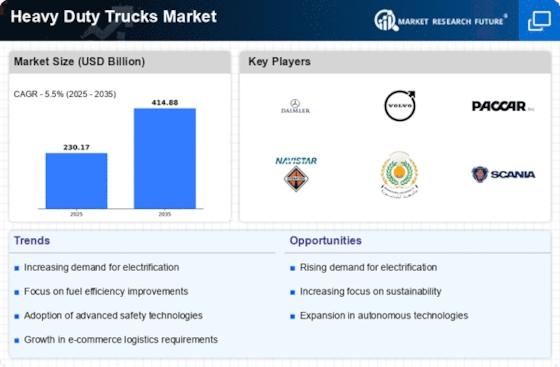Market Analysis
In-depth Analysis of Heavy Duty Trucks Market Industry Landscape
Electric trucks present a substantial advantage over conventional Internal Combustion Engine (ICE) propelled trucks due to their significantly reduced maintenance costs. These vehicles entail lower maintenance requirements owing to their fewer moving parts and reduced fluid changes, resulting in diminished servicing and replacement expenses. Traditional components such as engines, transmissions, and exhaust systems are replaced by maintenance-free brushless induction motors and batteries. Additionally, electric trucks enjoy lower insurance rates due to their elevated safety standards, further contributing to reduced operating costs.
Research from the Georgia Institute of Technology highlights that electric delivery trucks consume approximately 30% less energy and emit roughly 40% fewer greenhouse gases than their diesel counterparts, all while maintaining similar total costs when considering both purchase prices and operating expenses. This imperative to curtail operating costs in the intensely competitive logistics sector is a key driver fueling the demand for electric trucks. Consequently, manufacturers of electric trucks are consistently engaged in developing technologically advanced models. For instance, Daimler Trucks North America (DTNA) is slated to introduce an innovative fleet of approximately 30 electric trucks to initial customers in the US in 2019, intending to seamlessly integrate these vehicles into day-to-day transportation operations.
While the demand for electric trucks continues to surge, a notable challenge lies in the requirement for a highly skilled workforce to maintain these vehicles. Coupled with the relatively unproven nature of electric truck technology, these factors currently impede the widespread adoption of electric trucks. However, the ongoing development of electric truck support infrastructure and rapid technological advancements are anticipated to mitigate the impact of these hindrances. Consequently, the anticipated impact of the low operating costs of electric trucks on their demand is expected to transition from low to high during the forecast period.
Electric trucks represent a significant departure from conventional ICE propelled trucks, primarily due to their substantially reduced maintenance costs. These vehicles boast simplified maintenance requirements, characterized by fewer moving parts and decreased fluid changes, resulting in tangible reductions in servicing and replacement expenses. Traditional components such as engines, transmissions, and exhaust systems are replaced by low-maintenance brushless induction motors and batteries. Additionally, electric trucks enjoy lower insurance rates due to their heightened safety standards, further contributing to reduced overall operating costs.
Research conducted by the Georgia Institute of Technology underscores the environmental superiority of electric delivery trucks, consuming approximately 30% less energy and emitting roughly 40% fewer greenhouse gases compared to their diesel counterparts. Remarkably, this reduced environmental impact is achieved while maintaining similar total costs, factoring in both purchase prices and operating expenses. Within the fiercely competitive logistics sector, the imperative to streamline operating costs is a major catalyst propelling the burgeoning demand for electric trucks. Consequently, manufacturers in this domain are committed to continual advancements in technology. For instance, Daimler Trucks North America (DTNA) is poised to introduce an innovative fleet of approximately 30 electric trucks to initial US customers in 2019, aiming to seamlessly integrate these vehicles into everyday transportation operations.
Despite the escalating demand for electric trucks, a notable hurdle is the necessity for a highly skilled workforce to effectively maintain these vehicles. Additionally, the relatively unproven nature of electric truck technology currently serves as a barrier to widespread adoption. However, ongoing strides in developing electric truck support infrastructure and rapid technological advancements are anticipated to alleviate the impact of these obstacles. Consequently, the projected impact of the reduced operating costs associated with electric trucks on their demand is expected to transition from low to high during the forecast period.


















Leave a Comment